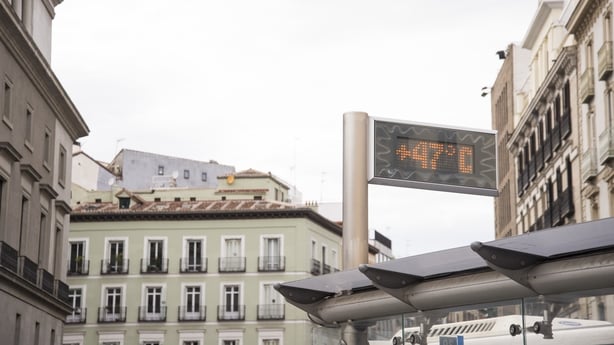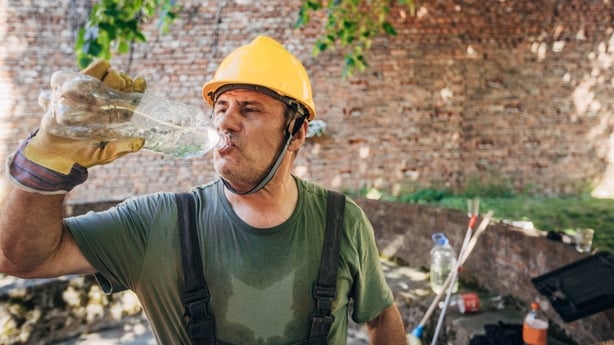Dr Eleni Myrivili, Global Chief Heat Officer to UN-Habitat and Arsht-Rock, and Professor John Sweeney, Climate Scientist and Emeritus Professor at Maynooth University joined Today with Claire Byrne to discuss the reality of living in extremely high temperatures. Listen back above.
If there's one thing we're good at in Ireland, it's complaining until summer arrives, and then complaining when it finally does.
We're not always the best when it comes to unusally hot weather, but it may soon become our everyday reality. According to the United Nations temperatures across Europe have increased at more than twice the global average over the last 30 years, the fastest rise of any continent on Earth.

Wildfires and unprecedented temperatures will continue to occur more often over the next century, it predicts. Extreme heat is more than just unpleasant and hard to dress for: it can lead to life-threatening situations and distress for many people and animals.
So how can we survive in these rising temperatures and what are the effects on our health?
Dr Myrivili highlighted that while extreme weather phenomena have been happening more and more around the world, "what has changed is the extremity".
"What we do have these last few decades is more frequent heatwaves, higher temperatures during our heatwaves and we also have longer periods of heat. All these things put together means that as we keep heating up the globe, the type of heat that we get in the cities that we'll have to survive is going to be more and more dangerous to our health."
Extreme heat is sometimes called the 'silent killer', Claire notes, as it can have serious implications on our health.
"We've been talking about global warming for decades but we haven't really put at all our effort in creating environments that are safe for people, as we knew that heat was going to be rising", Dr Myrivili said.
When temperatures rise, she added, "usually what happens to our bodies is the blood goes closer to the skin, which is our largest organ, trying to speed up the cooling process of our body, which is perspiration". She explained that we're one of the few creatures that has this mechanism.
"The micro doplets evaporate and that cools our skin", she said. "But after a point when we are hot for a very long time or we get dehydrated, our internal organs start heating up more and more, and that's when things get really dangerous."

Sweeney noted that since many Irish people aren't acclimatised to hot weather - as any sunburned tourist just back fro Spain will tell you - we should "pay more attention to the design of our cities, to the ways in which heat is trapped in our cities because our cities are focii of climate change".
He explained that we have swapped out moist vegetation and plants for concrete surfaces, which trap heat, so our cities become hotter and hotter, especially at night. This "urban heat island" phenomenon, as it's known, is becoming more common.
Dr Myrivili says we can confront this by raising awareness about how dangerous extreme heat is; short term measures to protect the most vulnerable people in periods of high temperatures, such as the elderly, people who work outside and pregnant women; and finally, redesigning our cities because, "our cities are not going to be fit for the next few decades for us to live in".
For more health advice for extreme heat, visit the HSE here.

